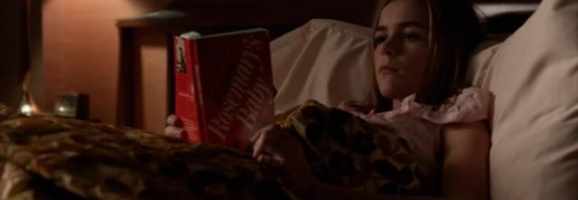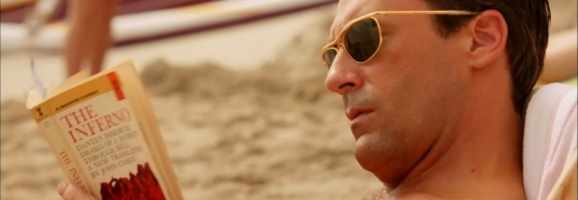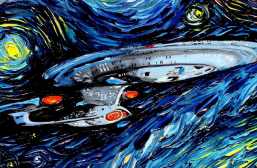The Literature of Mad Men
The AMC series Mad Men has seen much critical acclaim in its first six series; from the accuracy of the costumes, to the use of contemporary and classic literature in some scenes to highlight a character’s emotions or mental state. With the seventh and final season coming out at the beginning of next year; I thought I would run through some of the books we have seen featured in episodes so far.
Rosemary’s Baby- Ira Levin
Best-selling horror novel Rosemary’s Baby is seen being read by Sally Draper in episode 8 of the last season. The adult subject matter in the book and the important plot point of Rosemary not being taken seriously or believed by those closest to her may be carefully chosen themes that Weiner wants the audience to apply to Sally. In season 6 the character of Sally (Kiernan Shipka) is shown as increasingly grown up, yet belittled by her spiteful mother and at times uncaring father. This alienation caused by those she should be closest to is an issue shared by the protagonist in Levin’s novel, who’s own husband makes her out to be psychotic and seems to be closer in alliance with the strange elderly neighbours than with her: Making the scene where Sally is reading the book much more potent and edgy than if she were simply sitting in bed.

Another link that could be made between the novel and Sally’s character is the whole concept of a ‘Devil Child’. Betty, Sally’s mother (January Jones), is incredibly unsupportive and cold to her daughter. Even suggesting she attend a special school in order to ‘make’ her behave better. Given Sally’s family background it’s no surprise that she misbehaves from time to time; it’s expected if your father is an unloving drunk and your mother is a bitter, ageing, drama-queen! It will be interesting to see where this young character is taken in season 7 and equally interesting to see if the young actress portraying her will be able to keep up (unlike the actors playing her brother, who seems to have gone through several reincarnations).
Confessions of an Advertising Man- David Ogilvy
Mentioned specifically several times in season 3 as essential reading for the partners of Sterling Cooper, Confessions of an Advertising Man is arguably a major contributor into what the show is based on. When first published in 1963 this book made an immediate impact on advertising and its perception in the public sphere, cementing the name Ogilvy at the top of the advertising tree. Mad Men pays homage to the man himself on more than one occasion, with Don (Jon Hamm) and co. losing a client to Ogilvy’s firm in one episode, inferring his superiority over the sometimes overly praised Creative Director at SCDP. Although Ogilvy has not been explicitly shown in any of the first 6 seasons, his presence has definitely been felt in several episodes. How could a TV show about advertising in the 60s not pay homage to a man who revolutionized the field in that period?
Maybe in season 7, Roger Stirling (John Slattery) will once again hand this book to Don to get him back on track, before he falls faster than his silhouette in the title sequence.
The Inferno- Dante Alighieri

“Nel mezzo del cammin di nostra vita” Is how Dante begins the first instalment of his Divine Comedy: The Inferno. A line which roughly translates as :”In the middle of life’s journey” could not be more apt for Don Draper at the opening of season 6. A man in turmoil, facing the crises of mid-life along with the demons of his prostitute addled past. In two episodes entitled The Doorway, Don appears to be obsessed with Dante’s epic poem, reading it religiously while he is supposed to be relaxing on holiday with his stunning young wife Megan (Jessica Pare).
Right away we are given a hint as to what this season will hold for Don, one where he becomes increasingly isolated, introverted, and unpredictable. Merely by reeling off the titles that Dante has given to the rings of Hell in his poem, a viewer can guess some of the debauchery that Donald Draper will be encountering over the rest of the season (Lust, Greed, and Anger are to name but a few). A fine literature placement decision by Matthew Weiner, hopefully Don will witness plenty of Lust and Greed in season 7 also.
The Chrysanthemum and the Sword- Ruth Benedict
Ruth Benedict’s 1946 study is seen being read by Don, amongst others, in the season 4 episode of the same name when a newly formed Sterling Cooper Draper Pryce try to poach Honda from a rival agency. Often thought of as controversial nowadays (due to its slightly arrogant tone of an all-powerful USA looking in on a ‘strange and mysterious culture’), this study of Japan and its people was written in order to understand how their army might behave during WW2. It was hugely popular from its publication right through to 1965 and beyond when Mad Men is set in season 4.
Its use in the episode is supposed to benefit the Americans in their attempt to do business with Honda’s Japanese owners. However, the whole episode is laced with the irony that this could never happen, due to Roger Sterling’s (John Slattery) aggressive racist views and the more ignorant racism portrayed by the others who believe (just like Benedict’s book) that Japan has a culture that can be summarised in less than five hundred words. A very clever way for the series to highlight the often unintentionally ignorant views of a large portion of 1960s America.
Meditations in an Emergency- Frank O’Hara
Featured very early in the Mad Men saga, this incredibly insightful book of poetry is handed to Don by a stranger in a bar seemingly at random. The poetry within its pages seems to strike a chord with the ad-man who is struggling with his fake persona of Donald Draper and the lies it entails. Considering this, it does not move him enough to force a confession to his wife and friends, but we are treated to a moving recital of the final poem from the collection, Mayakovsky, during which the speaking voice contemplates love, suicide, and the existentialist problem which also plagues Don: “the catastrophe of my personality”.
Written in 1957 by New Yorker and art critic Frank O’Hara, the poems are a valuable insight into New York life around the late 50s and early 60s, a time of great promise and disillusionment in equal measure. At the beginning of season 2, Don personifies this mood- on the cusp of great success at work, but held back by his innate unhappiness. O’Hara’s poems certainly fit with Don’s self doubts. If a scene as touching as Jon Hamm’s recital is to be found in the final season, we are in for a treat.
Sterling’s Gold- Roger Sterling
I just couldn’t resist including the often ridiculed (by his work colleagues) memoirs of senior ad-boss Roger Sterling on this list. Played by the mercurial John Slattery, Roger often embodies the views of his generation and conveys them with a razor sharp wit that gives the show some of its best lines. Surprisingly, this is now actually a real book- but the reviews are not great so perhaps it isn’t worth a buy.

So there we have it! Some of the best examples of the great and varied literature embedded in Mad Men so far, used for a variety of reasons. Sometimes they have been utilised by Weiner and his group of writers just to show what was popular in 60s contemporary culture, others to give us a more complex insight into a character’s thoughts or actions. Either way, the inclusion of literature in this way is a fairly unusual device in television, one which I hope is continued in season 7 and copied by future TV shows to come.
What do you think? Leave a comment.











Great idea to write about the literature considering how well written this show is. For ages ago, I read an article on what we find on Don Drapers bookshelf, it is interesting too:
vulture.com/2008/07/don_drapers_mad_men_bookshelf.html
Confessions of An Advertising Man is an absolute classic! Definitely worth a read and so entertaining after all these years.
Seconded. This is a great book. It’s a must for any one who is going to want to work in advertising agency AND for anyone who is going to run ANY KIND of a business.
John Slattery is the MAN!
I’m an avid literature consumer and I have never heard of these. What does that make me? Hello amazon…
The only thing you should be ashamed of is never having heard of Dante.
I ordered Rosemary’s Baby for a very dear friend of mine who has just recently passed away. Before his passing he told me that this is still one of his most favorite books of all time.
A really well written and interesting observation of the TV programme
Such an interesting topic! I always notice literature in films and series and try to figure out whether or not it’s relevant; I especially noticed Don reading the Inferno but perhaps that’s because the link was one of the most blatant. Really enjoyed this article, one of the best I’ve read in a long time.
When I stumbled upon this I groaned because I thought it was just going to be a list of books we’ve seen placed in Mad Men, but when you started comparing the books to issues within the show, I was sold.
You really bring our attention to Mad Men’s best attribute: detailed characterization and storytelling. Every little thing in the show counts, and if fans such as you notice them, the experience of the show becomes more enriching.
Wow this is a great topic! I love everything about Mad Men but cannot understand why they will divide the final season into two? Like what they did with Breaking Bad. This will not work well for Mad Men as for BrBa.
Brilliant topic, really interesting and well observed!
I really enjoyed reading this. As someone who hasn’t watched Mad Men but has been meaning to for a long time, this has pushed me ever so closer to actually doing it. There’s nothing I love more than contemporary stories that draw on influential works of literature to inform their own narratives.
This was really interesting. I absolutely love Mad Men and I didn’t even THINK to compare it to literature. Well done!
I always felt like Dante’s Inferno was a little heavy handed for this show, but I love the inclusion of O’Hara there. Very apt.
I think the use of literature in Mad Men is particulary interesting. I completely agree when you say that not only does it give us an idea about was ‘popular’ during the period in question, but it also gives something away about the character and allow us some insight.
I’ll never forget, the first thing I did after watching Don Draper finish his copy of Meditations in an Emergency was get my hands on a copy. I did enjoy it. We knew very little about Don/Dick then, and I hoped reading Frank O’Hara could shed some light.
Thanks for sharing this!!
I’ve enriched my literary repertoire thanks to Mad Men and hope to continue to do so!
I loved this piece. Being a huge Mad Men fan myself, I have noted over the years the use of literature by Weiner to show some underlying plot themes. I think Inferno during Season 6 was a big indicator of where Don’s character was headed in terms of development that season. Great read!
This article reminds me of the extensive reading list that accompanied Lost. I definitely will look into obtaining a copy of Confessions of An Advertising Man.
I agree with Nilson Thomas Carroll’s comment about Inferno in season 4 of Mad Men. I will have to check out Confessions of an Advertising Man. This article reminded me of the extensive reading list that accompanied Lost.
Yes. I am so glad there is an article written about this. I love this series and the literature used that coincidentally parallels the characters lives. Many of these pieces of literature are must-reads and seeing them in outlets like these reminds me and I hope others to go back to reading them again.
What a cool article–great attention to detail!
This is such an excellent idea for an article – I really enjoyed it. I think literature is pretty central to the series, not least because it seems loosely inspired by ‘The Great Gatsby.’ The only other series I can think of which uses a similar tool is the slightly lighter ‘Gilmore Girls’.